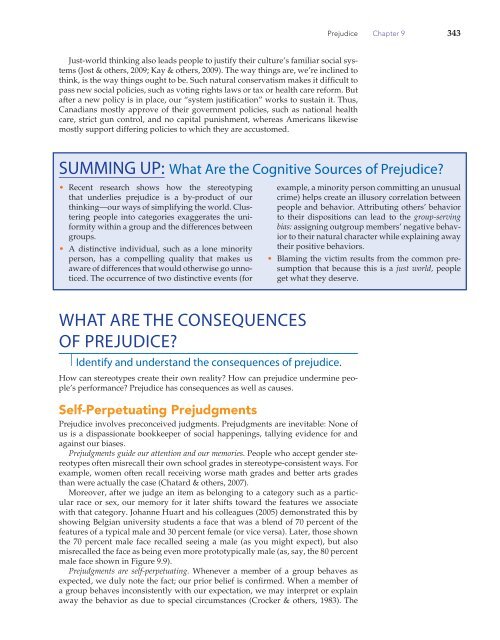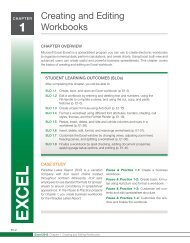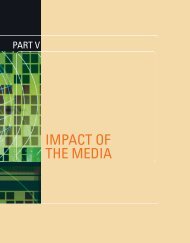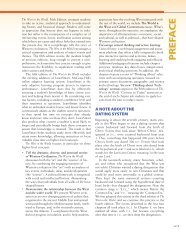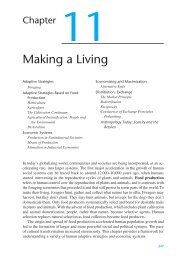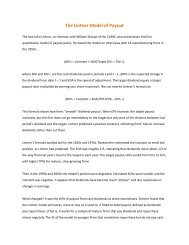Chapter 9: Prejudice: Disliking Others (2947.0K) - Bad Request
Chapter 9: Prejudice: Disliking Others (2947.0K) - Bad Request
Chapter 9: Prejudice: Disliking Others (2947.0K) - Bad Request
Create successful ePaper yourself
Turn your PDF publications into a flip-book with our unique Google optimized e-Paper software.
Just-world thinking also leads people to justify their culture’s familiar social systems<br />
(Jost & others, 2009; Kay & others, 2009). The way things are, we’re inclined to<br />
think, is the way things ought to be. Such natural conservatism makes it difficult to<br />
pass new social policies, such as voting rights laws or tax or health care reform. But<br />
after a new policy is in place, our “system justification” works to sustain it. Thus,<br />
Canadians mostly approve of their government policies, such as national health<br />
care, strict gun control, and no capital punishment, whereas Americans likewise<br />
mostly support differing policies to which they are accustomed.<br />
SUMMING UP:<br />
• Recent research shows how the stereotyping<br />
that underlies prejudice is a by-product of our<br />
thinking—our ways of simplifying the world. Clustering<br />
people into categories exaggerates the uniformity<br />
within a group and the differences between<br />
groups.<br />
• A distinctive individual, such as a lone minority<br />
person, has a compelling quality that makes us<br />
aware of differences that would otherwise go unnoticed.<br />
The occurrence of two distinctive events (for<br />
<strong>Prejudice</strong> <strong>Chapter</strong> 9 343<br />
What Are the Cognitive Sources of <strong>Prejudice</strong>?<br />
WHAT ARE THE CONSEQUENCES<br />
OF PREJUDICE?<br />
Identify and understand the consequences of prejudice.<br />
How can stereotypes create their own reality? How can prejudice undermine people’s<br />
performance? <strong>Prejudice</strong> has consequences as well as causes.<br />
Self-Perpetuating Prejudgments<br />
<strong>Prejudice</strong> involves preconceived judgments. Prejudgments are inevitable: None of<br />
us is a dispassionate bookkeeper of social happenings, tallying evidence for and<br />
against our biases.<br />
Prejudgments guide our attention and our memories. People who accept gender stereotypes<br />
often misrecall their own school grades in stereotype-consistent ways. For<br />
example, women often recall receiving worse math grades and better arts grades<br />
than were actually the case (Chatard & others, 2007).<br />
Moreover, after we judge an item as belonging to a category such as a particular<br />
race or sex, our memory for it later shifts toward the features we associate<br />
with that category. Johanne Huart and his colleagues (2005) demonstrated this by<br />
showing Belgian university students a face that was a blend of 70 percent of the<br />
features of a typical male and 30 percent female (or vice versa). Later, those shown<br />
the 70 percent male face recalled seeing a male (as you might expect), but also<br />
misrecalled the face as being even more prototypically male (as, say, the 80 percent<br />
male face shown in Figure 9.9 ).<br />
Prejudgments are self-perpetuating. Whenever a member of a group behaves as<br />
expected, we duly note the fact; our prior belief is confirmed. When a member of<br />
a group behaves inconsistently with our expectation, we may interpret or explain<br />
away the behavior as due to special circumstances (Crocker & others, 1983). The<br />
example, a minority person committing an unusual<br />
crime) helps create an illusory correlation between<br />
people and behavior. Attributing others’ behavior<br />
to their dispositions can lead to the group-serving<br />
bias: assigning outgroup members’ negative behavior<br />
to their natural character while explaining away<br />
their positive behaviors.<br />
• Blaming the victim results from the common presumption<br />
that because this is a just world, people<br />
get what they deserve.


